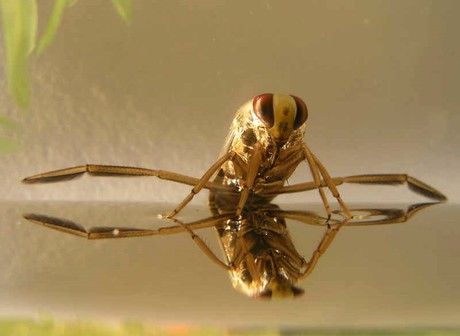A synthetic helper for a biological pesticide

With mosquitoes responsible for the transmission of several deadly diseases around the world, the fight against these insects is high on the agenda. At KU Leuven in Belgium, doctoral student Lin Op de Beeck and Professor Robby Stoks think they may have the answer.
“The control of vector mosquitoes is one of the biggest challenges facing humankind,” the scientists wrote in the journal Ecological Applications, “with the use of chemical pesticides often leading to environmental impact and the evolution of resistance.”
While biopesticides such as the Bacillus thuringiensis israelensis (Bti) bacteria are a possible alternative, mosquitoes are starting to develop a resistance to this pesticide as well. This means the dose of Bti needs to be increased in order to be effective, and is itself beginning to harm the environment. The KU Leuven researchers needed to develop a strategy that allowed the reduction of Bti concentrations while still keeping the mosquito problem under control.
“We already knew that chemical substances emitted by the backswimmer — a natural enemy of mosquito larvae in the water — trigger a stress response in mosquitoes,” said Op de Beeck. “This stress response, in turn, suppresses the mosquito’s immune system.
“Scientists have recently found a way to produce a synthetic version of these chemical substances known as predator cues. We discovered that this synthetic version triggers a stress response in the mosquitoes and impairs their immune system, just like the natural predator cues.”
This gave the researchers the idea to combine these synthetic predator cues with the biological pesticide, developing a cocktail of predator cues and a low, non-lethal dose of Bti.
“The predator cues trigger extra stress, so that the Bti had a strong impact despite its lower dose,” said Op de Beeck. “As a result, the mortality rates among mosquitoes were high.” Furthermore, as the predator cues of the backswimmer also have an impact on their targets’ immune system, the cocktail weakens the mosquitoes and larvae that it fails to kill.
“The surviving mosquitoes and mosquito larvae will probably have a shorter lifespan, so that the parasites they transmit don’t have the time to complete their incubation period,” said Op de Beeck. “As a result, the mosquitoes will transmit less diseases.”
The synthetic predator cues of the backswimmer are not very difficult to produce, making the production of the Bti cocktail relatively easy and cheap. According to Op de Beeck, the cocktail thus holds potential for a more efficient and more sustainable mosquito control.
“We need less Bti, so the impact on the environment is reduced and mosquitoes will be slower to build resistance,” she said.
Damaged RNA, not DNA, revealed as main cause of acute sunburn
Sunburn has traditionally been attributed to UV-induced DNA damage, but it turns out that this is...
Multi-ethnic studies identify new genes for depression
Two international studies have revealed hundreds of previously unknown genetic links to...
Oxygen deprivation may contribute to male infertility
Medical conditions that deprive the testes of oxygen, such as sleep apnoea, may be contributing...



